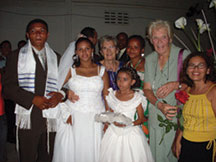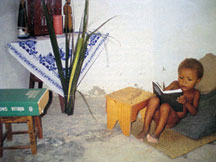Still a sign of contradiction
Subheading
By Sr. Clarice Garvey, O.L.M.
March/April 2009
Return to Table of Contents
Print Article
“Eu gosto” (I like) were the first words in the vocabulary of a two-year-old wonder who lived across the street from Sr. Janet MacDonell (now supervising this story from her privileged place with her Creator) and me. His name was Dimas and his home was not a happy one. Very early he learned where he could go to find food. Those were safer times in Fortaleza and homes were not as securely locked as they are today. We had a type of Dutch door, with the lower half conveniently easy for little folks to push and so make their way inside.
 Dimas and Natalia share the joy of their wedding day with Sisters Clarice Garvey (centre) and Mona Kelly (right).
Dimas and Natalia share the joy of their wedding day with Sisters Clarice Garvey (centre) and Mona Kelly (right).
Many a morning Janet and I awoke to the sound of a small voice calling us to the kitchen where Dimas sat waiting for breakfast, and later for lunch, and always for supper. He insisted on knowing what was in each pot on the stove and to our answer he always replied, “Eu gosto!”
At this point, I believe that some of you may think, with good reason, that you have heard this story before. In the 1991 issue of Scarboro Missions magazine Janet wrote about Dimas in an article entitled “A sign of contradiction”.
Since 1991, many changes have taken place and although we moved away from that area, Dimas kept in contact with us, mostly through Sr. Mona Kelly. A few months ago he came to visit us with Natalia, a pretty young woman whom he presented as the girl he was about to marry, and invited us to his wedding.
The wedding was a delight. It took place in an Evangelical chapel, beautifully decorated with flowers donated by Dimas’s boss and arranged by Dimas himself. The bride, dressed in a long white gown, walked down the aisle on the arm of her father and entered a small tent-like space behind the altar. After a few minutes Dimas, now a handsome young man, looking a little uncomfortable in dress shoes, a too-large suit, and a tie, rather strolled in, greeting his friends as he passed. He, too, entered the tent. A few minutes later the couple approached the altar and the marriage ceremony began.
When the ceremony ended, people gathered around to greet the bride and groom and to meet the other guests. It was obvious that this young couple have very kind friends who love them and will support them in their life together. As Dimas greeted us, he said he was quite sure that Elizabete (Sr. Janet MacDonell) was hovering over all of us with a special blessing for him and his wife.
 The Sisters knew Dimas since he was two years old and lived across the street from them. He visited every day for meals and enjoyed spending time reading in the Sisters’ chapel. (1991)
The Sisters knew Dimas since he was two years old and lived across the street from them. He visited every day for meals and enjoyed spending time reading in the Sisters’ chapel. (1991)
The celebrating continued in the home of the bride’s parents. When we sat down to the simple feast beautifully prepared, Dimas looked across the table at us with the same kiddish look of years ago and said, “Eu gosto!”
How is it that Dimas had grown to such dignity and maturity when so many young people with privileged backgrounds and opportunities have turned to drugs and violence?
How is it that Natalia’s mother, an attractive and respected seamstress in her community could say with tears of joy in her eyes that she was so happy for her daughter, so proud of her, and so fond of Dimas?
Going back to Janet’s article of 1991, it seems to me that Dimas is still a sign of contradiction.
Judy Cannato writes in her book, Radical Amazement, that God created and continues to create each being in consideration of every other created being. Can we imagine the depth of meaning this takes on in terms of relationships, whether in a marriage, a family, a community, a nation, or a universe?
Let us all pray for Natalia and Dimas that they may live happily and in peace together recognizing the gift that each is to the other.
Return to Table of Contents
Print Article